牛津译林版英语9AUnit3 teenage problems Revision课件PPT
牛津译林版英语9A Unit3 Teenage problems知识归纳与拓展

9A Unit3 Teenage problems 【单词拓展】1.deal vi.处理,对付(deal—dealt—dealt)→deal n.大量;很多;交易2.teenage adj.青少年的→teenager n.青少年→teens n.十几岁3.choice n.选择-→choose n.选择,挑选4.awake adj.醒着的--→wake v.醒来唤醒(wake--woke—woken)5.valuable adj.宝贵的;贵重的'→value n.价值;有用;重要→valueless adj.没有价值的;不值钱的6.worry n.担心;担忧的事-→worry v.担心→worrying adj.令人担忧的→worried adj.担忧的7.pronounce vt.发音→pronunciation n.发音,读音8.silence”.安静,寂静;沉默→silent adj.沉默的;寂静的→silently adv.沉默地9.s tress”.精神压力紧张→stressed adj.紧张的,感到有压力的10.suggestion n.建议→suggest vt.建议11.hardly adv.几乎不→hard adv.努力地;辛苦地12.imagine vt.&vi.想象;设想→imagination n.想象力13.worth adj.有……的价值,值得-→worthless adj.没用的;无价值的→worthy adj.值得的14.doubt vt.怀疑-→doubtful adj.不确定的;怀疑的15.solve vt.解决→solution n.解决办法【短语归纳】1,eat less and exercise more少吃多锻炼2.have enough time to do sth有足够的时间做某事3.drive sb mad使某人发狂4.have no choice but to do sth除了做某事以外别无选择5.stay up熬夜6.stay awake保持清醒7.offer sb some suggestions给某人提供一些建议8.develop our hobbies培养我们的爱好9.stay out late在外面待到很晚10.achieve a balance获得平衡11.work out算出;解决12.agree with sb同意某人(的看法)13.solve the problem解决问题14.pay no attention to 不理睬15.seem much happier显得更加高兴16.make progress in在……上取得进步17.be of sb’s age与……同龄【句型分析】1.I dream of a long holiday so that I could have more time for my hobbies.(P36) 句中的so that用来引导目的状语从句,常与may,can,will等连用,意为“为的是”,相当于“in order that”。
牛津译林版9AUnit3《teenageproblems》教学设计(共5课时)

2.短片观看后,引导学生分享自己的感受和认识,为新课学习奠定情感基础。
3.提问:“What kind of teenage problems do you think are the most common?”让学生预测本节课将讨论的青少年问题,激发学生的好奇心。
牛津译林版9AUnit3《teenageproblems》教学设计(共5课时)
一、教学目标
(一)知识与技能
1.学生能够理解并掌握本章节关于青少年问题的核心词汇和短语,如:conflict, communicate, independence, rebellion, stress, depression等,并能熟练运用这些词汇进行讨论和表达。
2.语法讲解:结合课文,讲解一般现在时、一般过去时等时态的用法,并举例说明。
3.词汇学习:通过例句、同义词、反义词等形式,帮助学生深入理解重点词汇和短语。
4.阅读策略:指导学生运用扫读、精读等策略,提高阅读理解能力。
5.课堂讲解:针对课文中的难点和重点,进行详细讲解,确保学生理解到位。
(三)学生小组讨论
4.个性化教学:针对不同学生的学习特点,实施差异化教学,提高教学效果。
5.教学评价:采用多元化的评价方式,如自我评价、同伴评价、教师评价等,全面评估学生的学习过程和成果。
6.家校合作:与家长保持沟通,了解学生在家的表现,共同关注学生的成长,形成教育合力。
四、教学内容与过程
(一)导入新课
在导入新课环节,教师将通过以下方式激发学生的学习兴趣和探究欲望:
4.教师展示与本节课相关的词汇和短语,如:conflict, communicate, independence等,让学生尝试猜测它们的意思,为新课学习做好词汇准备。
03最新牛津译林版 9A Unit 3 Teenage problems知识点讲解
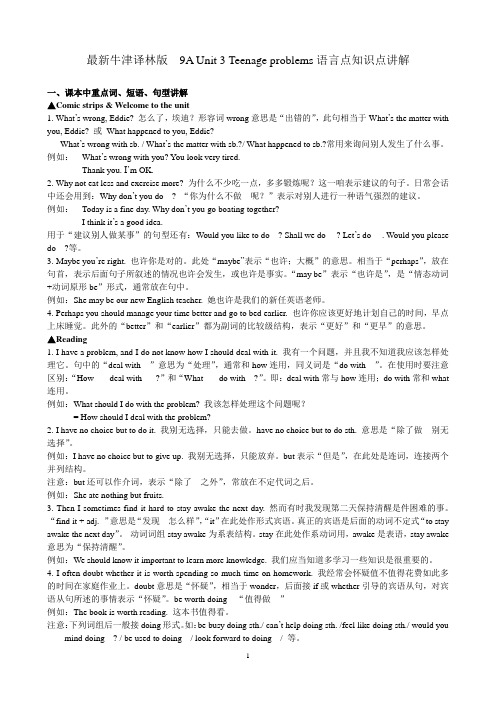
最新牛津译林版9A Unit 3 Teenage problems语言点知识点讲解一、课本中重点词、短语、句型讲解▲Comic strips & Welcome to the unit1. What’s wrong, Eddie? 怎么了,埃迪?形容词wrong意思是“出错的”,此句相当于What’s the matter with you, Eddie? 或What happened to you, Eddie?What’s wrong with sb. / What’s the matter with sb.?/ What happened to sb.?常用来询问别人发生了什么事。
例如:---What’s wrong with you? You look very tired.---Thank you. I’m OK.2. Why not eat less and exercise more? 为什么不少吃一点,多多锻炼呢?这一咱表示建议的句子。
日常会话中还会用到:Why don’t you do---? “你为什么不做---呢?”表示对别人进行一种语气强烈的建议。
例如:---Today is a fine day. Why don’t you go boating together?---I think it’s a good idea.用于“建议别人做某事”的句型还有:Would you like to do---? Shall we do ---? Let’s do ---. Would you please do---?等。
3. Maybe you’re right. 也许你是对的。
此处“maybe”表示“也许;大概”的意思。
相当于“perhaps”,放在句首,表示后面句子所叙述的情况也许会发生,或也许是事实。
“may be”表示“也许是”,是“情态动词+动词原形be”形式,通常放在句中。
牛津译林版英语九上Unit 3《Teenage problems》(Welcome to the u
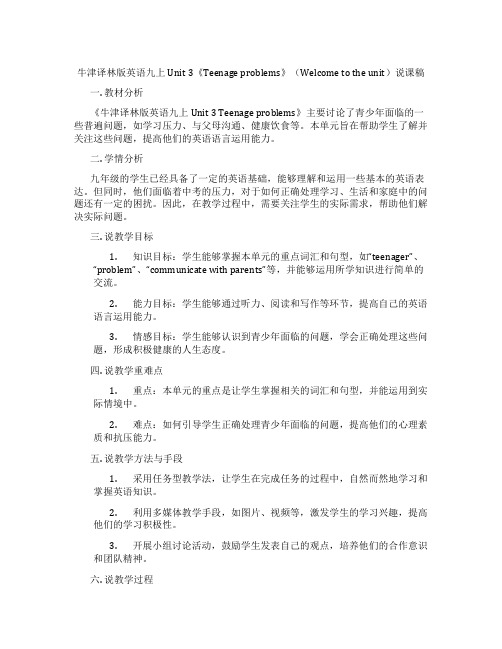
牛津译林版英语九上Unit 3《Teenage problems》(Welcome to the unit)说课稿一. 教材分析《牛津译林版英语九上Unit 3 Teenage problems》主要讨论了青少年面临的一些普遍问题,如学习压力、与父母沟通、健康饮食等。
本单元旨在帮助学生了解并关注这些问题,提高他们的英语语言运用能力。
二. 学情分析九年级的学生已经具备了一定的英语基础,能够理解和运用一些基本的英语表达。
但同时,他们面临着中考的压力,对于如何正确处理学习、生活和家庭中的问题还有一定的困扰。
因此,在教学过程中,需要关注学生的实际需求,帮助他们解决实际问题。
三. 说教学目标1.知识目标:学生能够掌握本单元的重点词汇和句型,如“teenager”、“problem”、“communicate with parents”等,并能够运用所学知识进行简单的交流。
2.能力目标:学生能够通过听力、阅读和写作等环节,提高自己的英语语言运用能力。
3.情感目标:学生能够认识到青少年面临的问题,学会正确处理这些问题,形成积极健康的人生态度。
四. 说教学重难点1.重点:本单元的重点是让学生掌握相关的词汇和句型,并能运用到实际情境中。
2.难点:如何引导学生正确处理青少年面临的问题,提高他们的心理素质和抗压能力。
五. 说教学方法与手段1.采用任务型教学法,让学生在完成任务的过程中,自然而然地学习和掌握英语知识。
2.利用多媒体教学手段,如图片、视频等,激发学生的学习兴趣,提高他们的学习积极性。
3.开展小组讨论活动,鼓励学生发表自己的观点,培养他们的合作意识和团队精神。
六. 说教学过程1.导入:通过展示一些青少年常见的问题,如学习压力、与父母沟通等,引导学生进入本课的主题。
2.呈现:教师通过图片、视频等手段,展示本课的重点词汇和句型,让学生初步感知和理解。
3.实践:学生通过听力、阅读和写作等环节,运用所学知识进行实际操作,巩固所学内容。
牛津译林版 9A Unit3 Teenage problems Revision课件(34页)

• • • • • • • • • • • • •
mad disturb communication deal choice complete refuse accept hardly spare doubt whether worth
• • • • • • • • • • • • • • •
• 主动提出 vt. • 建议 n. • 用途,积极作用 n. • 大量,充足 n. • 允许 vt. • 严格的,严厉的 adj. • 获得 vt. • 任务,工作 n. • (否定)也;二者之一adv.&pron • 勇气 n. • 事实,真理 n. • 留出,匀出 vt. • 注意,察觉 vt. • 青少年辅导员 • 宝贵的,很有用的 adj.
• • • • • • • • • • • • • • • • •
青少年工作者 知道怎样处理它 别无选择,只能--熬夜来完成练习 拒绝做这么多的工作 及时交作业 比如打排球和乒乓球 怀疑是否值得如此努力 期待一个没有家作的假日 允许我六点后在外面玩 允许某人做某事 使我们的生活更精彩 得到我父母的支持 在我的学业和我的爱好之间取得 平衡 对你有些价值 发现她的房子着火了 谢谢你的宝贵建议
Sharing teenage problems
Who would you like to tell about your problems?
ffer They’ll o______ you suggestions. aluable to you. Their suggestions will be v________
• • • • • • • • • • • • • • • • •
youth work know how to deal with it have no choice but to do stay up late to completethe exercises refuse to do so much work hand in the homework on time such as playing volleyball and pingpong doubt whether it is worth working so hard look forward to a holiday without homework allow me to play outside after 6:00 p.m. allow sb to do sth make our lives more interesting get my parents’ support achieve a balance between my school work and my hobbies be of some value to you find her house on fire thanks for your valuable suggestions
2018年牛津译林版九年级英语上册Unit 3《Teenage problems》(Integrated skills)课件
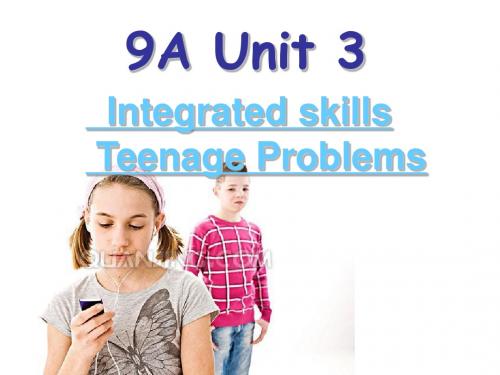
enough time He doesn’t have__________________ to do his homework.
I feel tired . I am so sleepy.
enough sleep He doesn’t have________________.
I’m so lonely
laugh at All her classmates _____________her.
I really enjoy eating. I’m fat but I hate exercising.
good at He is not _____________sports.
Do you have the same problems as these students? Can you share some with your classmates?
top students 4. She is one of the _______________in her class. What problems do you think Nora may have? 1. She is not very good at sports.
2. She doesn’t have many close friends
A1
Listen to the tape. Tick the correct information you hear about Nora.
Nora’s information a grade 9 student one of the top students love English, Maths and Chemistry always gets high marks in exams not very good at sports has many friends
牛津译林版英语9A Unit 3 Teenage problems Main Task(共13张PPT)
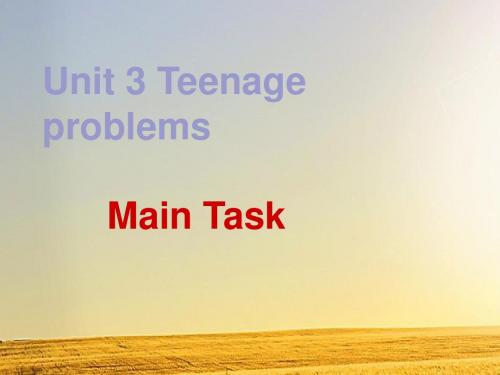
现象
经常跟父母发火,甚至几天不讲话
原因 措施(不少于 三点)
1.父母过分关注分数 2.我们…… 1.我们应该和父母沟通 2.我们…… 3.我们……
要求: 1)表达清楚,语法正确,上下文连贯; 2)必须包括所有相关信息,并作适当发挥; 3)词数:100词左右(演讲稿的开头与结尾已给出,不计入总词数) 4)不得使用真实姓名和校名等。
Unit 3 Teenage problems
Main Task
We all feel stressed. We suffer from stress. Do you know how to deal with it?
Read the passage on P56:
1. What are the causes of stress? 2. What are the ways to deal with stress?
Be not good at sports
Try your best in PE lessons and enjoy the exercise
Have no courage to share with your friends your worries
Try not to keep your worries to yourself
二、评分档次: 一档文(17-20分) 写出全部内容要点,层次清楚、语言流畅,有句式变化,
有复杂结构。 二档文(13-16分) 基本写出全部内容要点,层次清楚、语言流畅,有少量
语法错误。
三档文(9-12分)写出大部内容要点,语言基本通顺有一些语法和拼写错误。
四档文(5-8分) 写出一半左右有关内容要点,言不通,影响理解。 五档文(0-4分)言不达意,不知所云。
牛津译林版9AUnit3《Teenageproblems》教学设计(共9课时)

c.对优秀学生,提供拓展性学习资源,满足他们的学习需求。
3.创设情境,激发学生兴趣:
a.结合学生实际,设计真实、有趣的情境,让学生在情境中学习、运用英语。
b.鼓励学生积极参与课堂活动,提高他们的课堂参与度。
4.评价与反馈:
a.采用多元化的评价方式,关注学生的全面发展。
4.小组合作,准备一个关于青少年问题的角色扮演活动,下节课进行展示。要求每个小组成员参与,运用所学知识进行对话创编。
5.鼓励学生进行课外阅读,选取一篇关于青少年问题的英文文章进行阅读,并完成阅读笔记,记录文章中的生词、短语和有用句型。
6.结合自己的生活实际,思考如何运用所学知识解决青少年时期遇到的问题,并撰写一篇心得体会。
五、作业布置
为了巩固本章节所学知识,确保学生对词汇、语法和语言运用能力的掌握,特布置以下作业:
1.复习本单元的生词和短语,要求学生进行词汇卡片制作,注明单词的音标、词性和中文释义,以便于课后巩固记忆。
2.完成课后练习册中与本单元相关的练习题,重点关注宾语从句、状语从句的运用及不同时态的描述。
3.撰写一篇关于青少年问题的短文,要求运用本节课所学的词汇、语法和句型,字数在100-120词左右。短文内容可涉及以下方面:描述一个青少年问题、分析问题产生的原因、提出解决方案。
牛津译林版9AUnit3《Teenageproblems》教学设计(共9课时)
一、教学目标
(一)知识与技能
在本章节的教学中,学生将通过学习牛津译林版9AUnit3《Teenageproblems》的内容,掌握以下知识与技能:
1.掌握并运用本单元的生词、短语和句型,如:irritate, confident, deal with, adjust to, communicate with等,提高英语语言表达能力。
牛津译林版九年级英语上册 Unit 3 Teenage problems Grammar 教学设计

牛津译林版九年级英语上册Unit 3 Teenage problems Grammar 教学设计9A Unit 3 Teenage problems【Teaching contents】Grammar【Teaching aims】To learn object clauses introduced by question words. To learn how to give suggestions.Talk about teenage problems with object clauses introduced by question words.【Teaching important and difficult points】To learn object clauses introduced by question words.To learn how to give suggestions.【Teaching methods】Communicative Approach, situational Method 【Teaching procedures】Tape-recorder, Multi-mediaPart One Revision (Translation)First, ask the students to try to translate the following sentences:1. 我想知道我该做什么。
2. Daniel不知道他该和谁交谈。
3. 有时我们忘记我们应该什么时候停止。
4. 我不能理解为什么他们对我如此严格。
5. 我不知道我该怎样处理这个问题。
Part Two Object clausesStep 1 Read and find1. Check the answer and pay attention to the structure.2. Read the sentences of Part A on Page 40 find the object clauses.Step 2 PracticeStudents are talking about their problems. Help them complete each object clause below with a correct question word.Finish the exercise in part A1 and read the object clauses.Step 3 Work out the rule1.从句中要用陈述语序而不用疑问语序,即引导词+主语+谓语+其他。
九年级英语上册《Unit 3 Teenage problems》课件 牛津译林版

Pair work:
• Does he/she have any problems? • What’s his/her problem? • How do you deal with his/heillie’s problem Homework stay up late sad spare time look forward to
problems
no time for Choose one hobby to do each day hobbies
How to solve Simon’s problems
Name: Crazy about: Problem: Simon __________ His parents do not
Feel less __________before exams. worried
achieve ___________ a balance between my study and my hobbies
If you feel stressed, who would you like to talk to?
主语 适形填空,并说出在句中的成分
(Subject)
1. It is good _______ to hand (hand)in homework on time. to become (become)a 宾语补足语 2. My dream is _____________ (Object complement) 宾语( Object ) great football player. to hear hear) from you soon. 3. I hope_______( to shout 4. Mr Wu tells the students not __________(not 定语 shout) in class. Attributive) 5. Mr Wu is always the last 状语( Adverbial to express purpose) to leave _________( leave). to catch (catch )the first bus. 6. She ran fast _______ to be 7. The little baby has grown up ______(be) a beautiful girl. 状语(Adverbial to express result)
牛津译林版英语九上9A Unit 3 Teenage problems
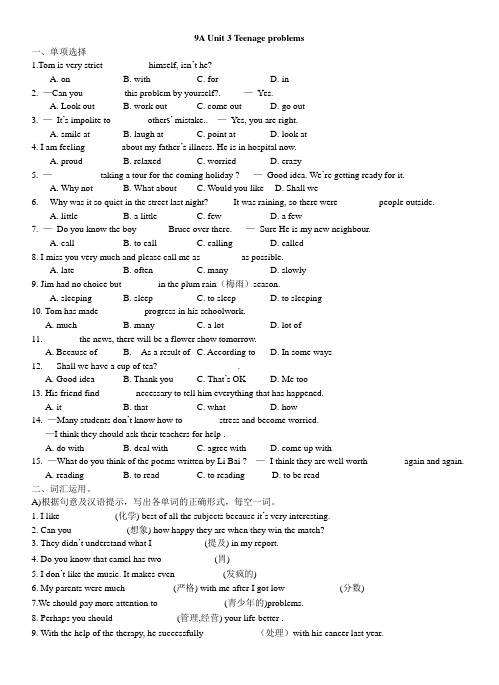
9A Unit 3 Teenage problems一、单项选择1.Tom is very strict _________ himself, isn’t he?A. onB. withC. forD. in2. —Can you ________ this problem by yourself?. —Yes.A. Look outB. work outC. come outD. go out3. —It’s impolite to _______ other s’ mistake.. —Yes, you are right.A. smile atB. laugh atC. point atD. look at4. I am feeling _______ about my father’s illness. He is in hospital now.A. proudB. relaxedC. worriedD. crazy5. —_________ taking a tour for the coming holiday ? —Good idea. We’re getting ready for it.A. Why notB. What aboutC. Would you likeD. Shall we6. ---Why was it so quiet in the street last night? --- It was raining, so there were ________ people outside.A. littleB. a littleC. fewD. a few7. —Do you know the boy ______ Bruce over there. —Sure He is my new neighbour.A. callB. to callC. callingD. called8. I miss you very much and please call me as ________ as possible.A. lateB. oftenC. manyD. slowly9. Jim had no choice but _______ in the plum rain(梅雨)season.A. sleepingB. sleepC. to sleepD. to sleeping10. Tom has made _________ progress in his schoolwork.A. muchB. manyC. a lotD. lot of11. _______ the news, there will be a flower show tomorrow.A. Because ofB. As a result ofC. According toD. In some ways12. --- Shall we have a cup of tea? --- ________.A. Good ideaB. Thank youC. That’s OKD. Me too13. His friend find _______ necessary to tell him everything that has happened.A. itB. thatC. whatD. how14. —Many students don’t know how to _______ stress and become worried.—I think they should ask their teachers for help .A. do withB. deal withC. agree withD. come up with15. —What do you think of the poems written by Li Bai ?—I think they are well worth _______ again and again.A. readingB. to readC. to readingD. to be read二、词汇运用。
2022年牛津译林版 《Unit3 Teenage Problems Revision》教案

4、了解There be句型与have/ has的区别
教
学
方
法
discussion
practice
能力目标
To complete an article with the information
情感目标
To make communications with the related topics
You also said thatyou do not have enough time for your ______. Perhaps you can choose one hobby to do each day, for example, playing _______ today and playing ping-pong the next day.I hopethat my advice is______taking.
(1)Why does Lily bring a box of crayons with her
(2)How is Millie’s watch
(3)What does Simon like doing
(4)What kind of activities do Nick and Peter like doing ,playing football or reading storybooks
Step 1〔合并成一〕
1 When did the train leave I want to know
I want to knowwhen the train left
2 What time did she get up The young man asked.
牛津译林版英语九上9A Unit 3 Teenage problems
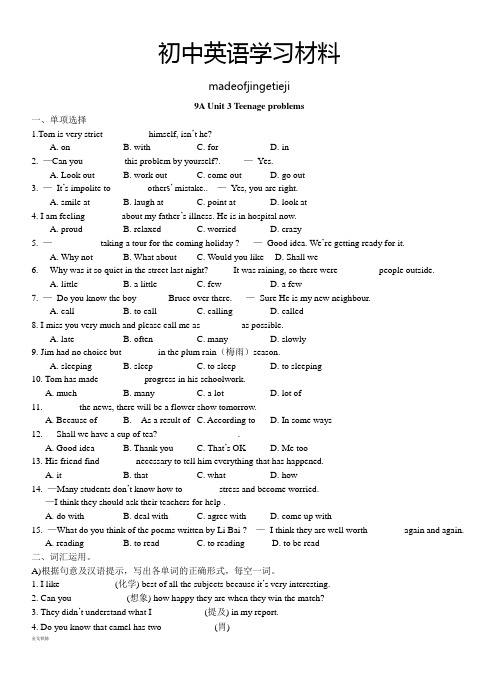
初中英语学习材料madeofjingetieji9A Unit 3 Teenage problems一、单项选择1.Tom is very strict _________ himself, isn’t he?A. onB. withC. forD. in2. —Can you ________ this problem by yourself?. —Yes.A. Look outB. work outC. come outD. go out3. —It’s impolite to _______ other s’ mistake.. —Yes, you are right.A. smile atB. laugh atC. point atD. look at4. I am feeling _______ about my father’s illness. He is in hospital now.A. proudB. relaxedC. worriedD. crazy5. —_________ taking a tour for the coming holiday ? —Good idea. We’re getting ready for it.A. Why notB. What aboutC. Would you likeD. Shall we6. ---Why was it so quiet in the street last night? --- It was raining, so there were ________ people outside.A. littleB. a littleC. fewD. a few7. —Do you know the boy ______ Bruce over there. —Sure He is my new neighbour.A. callB. to callC. callingD. called8. I miss you very much and please call me as ________ as possible.A. lateB. oftenC. manyD. slowly9. Jim had no choice but _______ in the plum rain(梅雨)season.A. sleepingB. sleepC. to sleepD. to sleeping10. Tom has made _________ progress in his schoolwork.A. muchB. manyC. a lotD. lot of11. _______ the news, there will be a flower show tomorrow.A. Because ofB. As a result ofC. According toD. In some ways12. --- Shall we have a cup of tea? --- ________.A. Good ideaB. Thank youC. That’s OKD. Me too13. His friend find _______ necessary to tell him everything that has happened.A. itB. thatC. whatD. how14. —Many students don’t know how to _______ stress and become worried.—I think they should ask their teachers for help .A. do withB. deal withC. agree withD. come up with15. —What do you think of the poems written by Li Bai ?—I think they are well worth _______ again and again.A. readingB. to readC. to readingD. to be read二、词汇运用。
